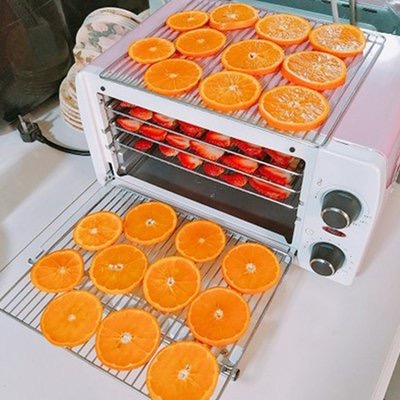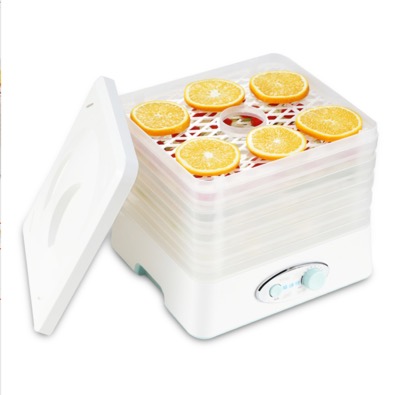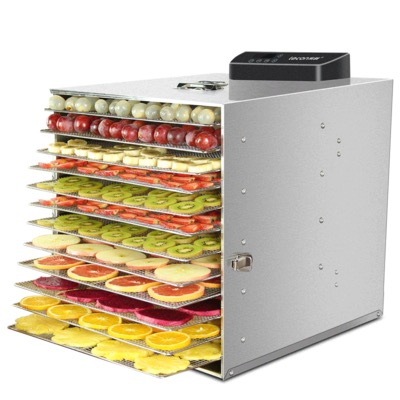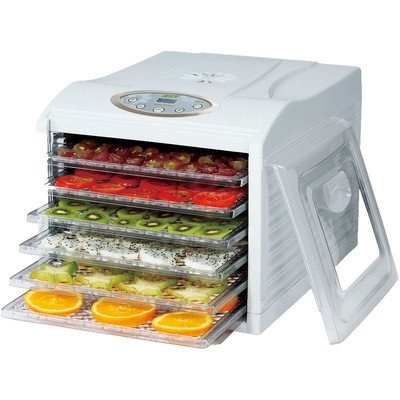
Content Menu
● Introduction to Wholesale Dryer Machines for Fruit and Vegetable Processing
● Understanding the Technology Behind Wholesale Dryer Machines
>> Key Components of a Wholesale Dryer Machine
>> Drying Methods in Industrial-Grade Fruit and Vegetable Dryers
● Benefits of Using Wholesale Dryer Machines for Fruit and Vegetable Processing
>> 1. Increased Production Capacity
>> 2. Consistent Quality
>> 3. Extended Shelf Life
>> 4. Preservation of Nutrients
>> 5. Versatility
>> 6. Energy Efficiency
● Choosing the Right Wholesale Dryer Machine for Your Business
>> 1. Production Capacity
>> 2. Types of Produce
>> 3. Energy Efficiency
>> 4. Temperature and Humidity Control
>> 5. Ease of Use and Maintenance
>> 6. Build Quality and Durability
● Innovations in Wholesale Food Drying Technology
>> 1. Smart Controls and Automation
>> 2. Energy Recovery Systems
>> 3. Hybrid Drying Technologies
>> 4. Modular Designs
● Best Practices for Using Wholesale Dryer Machines
>> 1. Proper Produce Preparation
>> 2. Optimal Loading
>> 3. Temperature and Humidity Management
>> 4. Regular Maintenance
>> 5. Quality Control
● Applications of Wholesale Dryer Machines in Various Industries
>> 1. Snack Food Industry
>> 2. Soup and Seasoning Manufacturing
>> 3. Pet Food Production
>> 4. Nutraceuticals
>> 5. Cosmetics Industry
● The Future of Wholesale Food Drying Technology
>> 1. AI-Powered Optimization
>> 2. Sustainable Designs
>> 3. Enhanced Nutrient Preservation
>> 4. IoT Integration
● Conclusion
● Frequently Asked Questions
>> 1. What is the average drying time for fruits and vegetables in a wholesale dryer machine?
>> 2. How do wholesale dryer machines compare to traditional drying methods?
>> 3. Can wholesale dryer machines be used for organic produce processing?
>> 4. What maintenance is required for a wholesale dryer machine?
>> 5. How energy-efficient are modern wholesale dryer machines for fruit and vegetable processing?
Introduction to Wholesale Dryer Machines for Fruit and Vegetable Processing
In today's fast-paced food industry, the demand for efficient and high-quality food preservation methods has never been higher. At the forefront of this revolution are wholesale dryer machines specifically designed for fruit drying and vegetable preservation. These industrial food dehydrators have become indispensable tools for businesses looking to extend the shelf life of produce while maintaining nutritional value and flavor.
Understanding the Technology Behind Wholesale Dryer Machines
Wholesale dryer machines for fruit drying and vegetable preservation are sophisticated pieces of equipment that utilize advanced technology to remove moisture from produce efficiently. These commercial fruit and vegetable dryers are designed to handle large volumes of produce, making them ideal for industrial-scale operations.
Key Components of a Wholesale Dryer Machine
1. Drying Chamber: The main compartment where fruits and vegetables are placed for dehydration.
2. Heating System: Generates the warm air necessary for the drying process.
3. Air Circulation System: Ensures even distribution of heat and consistent drying.
4. Temperature and Humidity Controls: Allow precise adjustment of drying conditions.
5. Multi-tier Trays: Enable processing of various produce types simultaneously.
6. Energy Recovery System: Recycles heat to improve efficiency.
Drying Methods in Industrial-Grade Fruit and Vegetable Dryers
1. Hot Air Circulation: The most common method, using heated air to remove moisture.
2. Freeze Drying: Ideal for preserving delicate fruits and vegetables.
3. Infrared Drying: Utilizes infrared radiation for efficient moisture removal.
4. Microwave Drying: Offers rapid drying for certain types of produce.

Benefits of Using Wholesale Dryer Machines for Fruit and Vegetable Processing
Investing in a commercial fruit and vegetable dryer or bulk produce drying equipment offers numerous advantages for businesses in the food industry:
1. Increased Production Capacity
Large-scale food dehydration machines can process substantial quantities of fruits and vegetables in a single batch, significantly boosting production output.
2. Consistent Quality
Industrial-grade fruit and vegetable dryers ensure uniform drying across all batches, maintaining consistent quality and texture in the final product.
3. Extended Shelf Life
By efficiently removing moisture, these machines help extend the shelf life of fruits and vegetables, reducing waste and increasing profitability.
4. Preservation of Nutrients
Advanced drying technologies in wholesale food preservation systems help retain essential vitamins and minerals in dried produce.
5. Versatility
These machines can handle a wide variety of fruits and vegetables, allowing businesses to diversify their product offerings.
6. Energy Efficiency
Modern wholesale dryer machines are designed with energy-efficient features, helping businesses reduce operational costs.
Choosing the Right Wholesale Dryer Machine for Your Business
Selecting the appropriate bulk produce drying equipment is crucial for maximizing efficiency and product quality. Consider the following factors when choosing a wholesale dryer machine for fruit drying and vegetable preservation:
1. Production Capacity
Assess your business's current and future production needs to select a machine with the right capacity.
2. Types of Produce
Different fruits and vegetables may require specific drying conditions. Ensure the machine can accommodate the varieties you plan to process.
3. Energy Efficiency
Look for machines with energy-saving features to reduce long-term operational costs.
4. Temperature and Humidity Control
Precise control over temperature and humidity is essential for maintaining product quality. Choose a machine with accurate and adjustable settings.
5. Ease of Use and Maintenance
Opt for user-friendly machines that are easy to clean and maintain, reducing downtime and labor costs.
6. Build Quality and Durability
Invest in a high-quality, industrial-grade fruit and vegetable dryer built to withstand continuous commercial use.

Innovations in Wholesale Food Drying Technology
The field of commercial-scale fruit and vegetable processing is constantly evolving, with new technologies emerging to improve efficiency and product quality:
1. Smart Controls and Automation
Modern wholesale dryer machines often feature advanced control systems, allowing for precise monitoring and adjustment of drying parameters.
2. Energy Recovery Systems
Some high-end models incorporate energy recovery technologies to recycle heat and reduce overall energy consumption.
3. Hybrid Drying Technologies
Innovative machines combine multiple drying methods, such as hot air and infrared, for optimal results with different produce types.
4. Modular Designs
Scalable, modular produce drying machines offer flexibility for businesses to expand their production capacity as needed.
Best Practices for Using Wholesale Dryer Machines
To maximize the benefits of your industrial-grade fruit and vegetable dryer, follow these best practices:
1. Proper Produce Preparation
Ensure fruits and vegetables are properly washed, sorted, and sliced before drying to achieve consistent results.
2. Optimal Loading
Arrange produce in a single layer on drying trays, allowing for proper air circulation.
3. Temperature and Humidity Management
Use the appropriate temperature and humidity settings for each produce type to preserve flavor and nutrients.
4. Regular Maintenance
Clean and maintain your wholesale dryer machine regularly to ensure optimal performance and longevity.
5. Quality Control
Implement a robust quality control process to maintain consistency in your dried fruit and vegetable products.
Applications of Wholesale Dryer Machines in Various Industries
The versatility of industrial-grade fruit and vegetable dryers extends beyond traditional produce processing:
1. Snack Food Industry
Production of healthy, dried fruit and vegetable snacks.
2. Soup and Seasoning Manufacturing
Creating dried vegetable ingredients for instant soups and seasoning blends.
3. Pet Food Production
Developing dried fruit and vegetable additives for pet foods.
4. Nutraceuticals
Creating dried fruit and vegetable powders for nutritional supplements.
5. Cosmetics Industry
Producing dried botanical ingredients for natural cosmetics.
The Future of Wholesale Food Drying Technology
As the demand for dried fruits and vegetables continues to grow, the technology behind wholesale dryer machines is expected to advance further:
1. AI-Powered Optimization
Integration of artificial intelligence to optimize drying processes based on produce characteristics and environmental factors.
2. Sustainable Designs
Development of eco-friendly fruit and vegetable drying machines with reduced environmental impact.
3. Enhanced Nutrient Preservation
Advanced technologies focused on maximizing the retention of vitamins and antioxidants in dried produce.
4. IoT Integration
Implementation of Internet of Things (IoT) capabilities for remote monitoring and control of drying processes.
Conclusion
Wholesale dryer machines for fruit drying and vegetable preservation have revolutionized the food industry, offering businesses the ability to produce high-quality dried produce on a commercial scale. From industrial food dehydrators to large-scale food dehydration machines, these powerful devices have become indispensable in meeting the growing demand for healthy, convenient snacks and ingredients. As technology continues to advance, we can expect even more innovative solutions in the realm of commercial fruit and vegetable dryers and bulk produce drying equipment, further enhancing efficiency, quality, and sustainability in food processing.

Frequently Asked Questions
1. What is the average drying time for fruits and vegetables in a wholesale dryer machine?
Answer: The drying time can vary depending on the type of produce, its moisture content, and the specific machine used. On average, it can take anywhere from 6 to 48 hours to fully dry fruits and vegetables in a commercial food dehydrator. Leafy greens and thinly sliced vegetables tend to dry faster, while denser fruits and root vegetables may take longer.
2. How do wholesale dryer machines compare to traditional drying methods?
Answer: Wholesale dryer machines offer several advantages over traditional drying methods such as sun-drying or air-drying. They provide consistent results regardless of weather conditions, offer faster drying times, and allow for better control over the drying process. This results in higher quality dried produce with better preservation of nutrients and flavor. Additionally, industrial-grade fruit and vegetable dryers can process large quantities of produce year-round, making them more suitable for commercial production.
3. Can wholesale dryer machines be used for organic produce processing?
Answer: Yes, wholesale dryer machines can be used for organic produce processing. Many models are designed with food-grade materials and do not introduce any additives or chemicals during the drying process. However, to maintain organic certification, it's important to ensure that the machine and all processing methods comply with organic standards and regulations. Some manufacturers offer specialized organic-certified dryers for this purpose.
4. What maintenance is required for a wholesale dryer machine?
Answer: Regular maintenance of a wholesale dryer machine typically includes:
- Cleaning the drying trays and interior after each use
- Checking and cleaning air filters regularly
- Inspecting and cleaning the fan and heating elements
- Calibrating temperature and humidity sensors periodically
- Lubricating moving parts as recommended by the manufacturer
- Conducting regular inspections for any signs of wear or damage
Proper maintenance ensures optimal performance, extends the machine's lifespan, and maintains the quality of the dried produce.
5. How energy-efficient are modern wholesale dryer machines for fruit and vegetable processing?
Answer: Modern wholesale dryer machines are designed with energy efficiency in mind. Many models incorporate features such as:
- Improved insulation to reduce heat loss
- Energy-efficient heating elements and fans
- Smart controls that optimize energy use based on the drying load
- Heat recovery systems that recycle warm air
These features can significantly reduce energy consumption compared to older models. Some high-efficiency industrial food dehydrators can use up to 30-50% less energy than their conventional counterparts, leading to substantial cost savings for businesses in the long run. Additionally, some manufacturers are developing solar-powered or hybrid energy systems for even greater sustainability in food drying operations.












